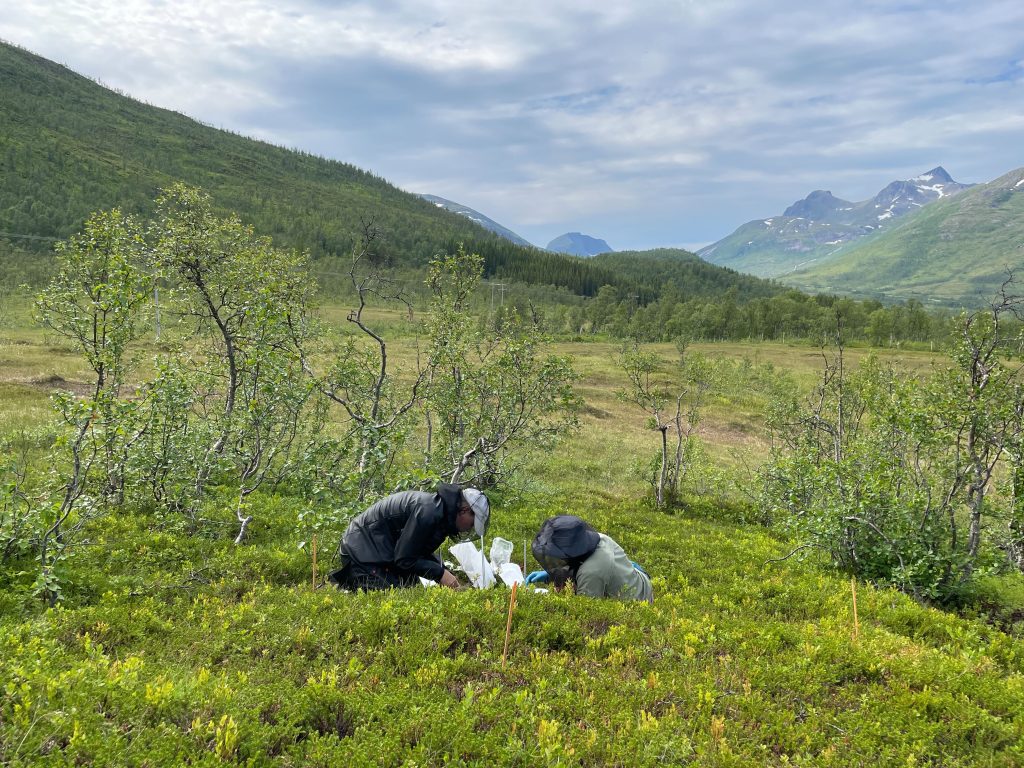Are you interested in plant-soil interactions and mycorrhizal associations in nordic environments? Come work with us!
Dwarf-shrubs are a dominant plant functional group across the boreal, arctic and alpine biomes, and they play important roles for biodiversity, ecology and ecosystem functioning in the habitats in which they occur. For example, dwarf-shrubs provide important food resources for grazers, pollinators, and people and habitat for other plants, insects, rodents, and birds. Through interactions with belowground fungal networks (ericoid mycorrhiza), they play critical roles in carbon sequestration and long-term carbon storage in soils, suggesting that dwarf-shrubs may play a critical role in feedbacks from land to the climate system.
DURIN will explore the role of dwarf-shrubs in climate responses and feedbacks across biomes and habitats in Norway, integrating plant physiology, ecology, and ecosystem science. Using distributed observational systems, field experiments, and growth chamber studies, we will obtain fundamental knowledge on how climate change directly and indirectly affects this important plant functional group, and its ecosystem functions and services. This improved process understanding will be integrated in land surface and earth system models to understand the role and contribution of dwarf-shrubs in the feedbacks from terrestrial vegetation to the climate system.
The PhD candidate will be working within WP2 (Species interactions), focussing on plant-mycorrhizal interactions. The candidate will, for example:
- Take part in the selection of field sites and implementation of the experimental setup.
- Analyse the diversity and distribution of dwarf-shrub fungal associations from plant and soils samples using high throughput DNA sequencing (DNA metabarcoding).
- Investigate ErM contributions to carbon dynamics using e.g. exclusion experiments and litter/necromass bags, to assess decomposition processes and ingrowth bags to assess mycelial production via ergosterol measurements.
- Conduct resynthesis experiments in controlled climates to assess the effect of ErM on dwarf-shrub performance and climate response.
- In collaboration with other project participants, assess climate control of dwarf-shrub interactions beyond the fungusphere (e.g., pollination, berry production, plant-plant interactions) and participate in globally distributed experiments, especially those focussing on interactions.
- Develop their own research questions and hypotheses related to these experiments and measurements.
- Collaborate with other ecologists and climate scientists over synthesis and upscaling.
- Use open and transparent workflows to manage, analyse, and openly share data.
- Both lead and contribute to writing and publishing collaborative research papers.
This is a collaborative project between the University of Bergen and the University of Oslo, where the fungal work will be led and conducted at the University of Oslo. The PhD Research Fellow will be working closely with both institutions, including extended works stays in Oslo for lab and analytical work.
For more details and to apply, visit the official announcement on jobbnorge.no
Durin fieldwork on Senja, July 2023

